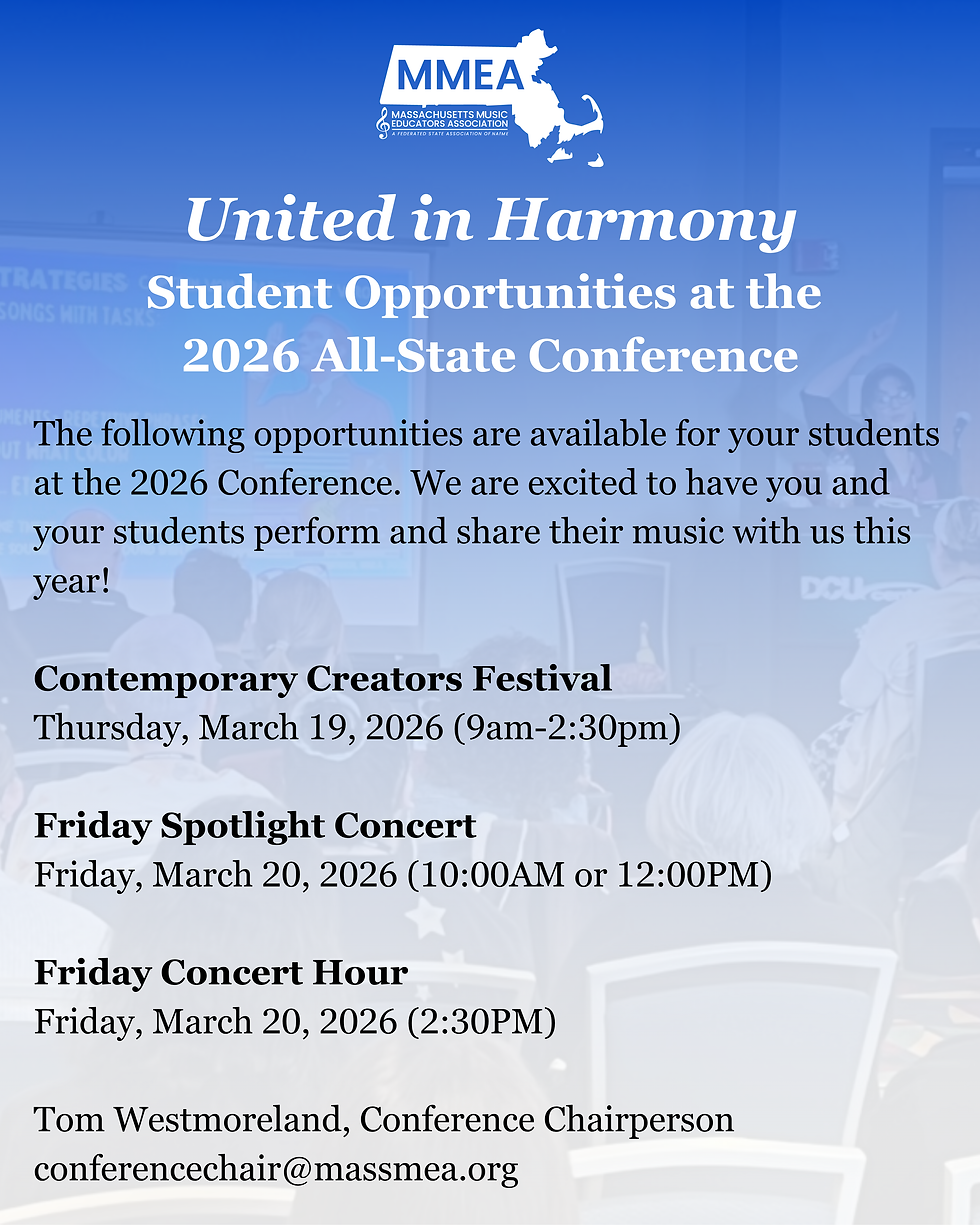Future Music Educators and Music Program Leaders Summit
- Oct 8, 2025
- 3 min read
Updated: Feb 24

The Future Music Educators Summit on November 17th at 9:00 AM at the Worcester Area Mission Society, Worcester, MA
The MMEA Future Music Educators Summit provides a unique platform for students to explore pathways into music education, fostering connections with mentors and experts in the field.
This opportunity is open to Massachusetts high school students in grades 9-12 interested in the field of music education. The event features collegiate and music educator panels, breakout workshops, time for conversations with college representatives, and a keynote address by Cameron W. Jenkins.
There is a limit of 8 students per high school. If a school would like to bring more than 8 students, please contact president@massmea.org to see if we can fulfill the request.
Schedule of the Day:
8:30-9:00: Student Check-In at Main Room
9:00-9:15: Main Room - Welcome
9:15-10:15: Keynote Speaker: Cameron W. Jenkins
10:15-10:30: Break
10:30-11:15: Breakout Sessions Part 1:
Room 1: Gordon College - Music Teachers Change Lives
Room 2: UMass Dartmouth - Teaching Music, Building Connections
Room 3: Bridgewater State University
Room 4: Westfield State University
11:15-11:30: Break and Rejoin in the Main Hall
11:30-12:00: Collegiate Table Carousel - Students and Chaperones will travel around collegiate tables for handouts and more information.
12:00-12:30: Lunch - Students and Chaperones (bring their own lunches)
12:30-1:15: Breakout Sessions Part 2:
Room 1: Boston University
Room 2: Berklee College of Music
Room 3: UMass Boston
Room 4:
1:15-2:00: Music Program Leaders and Future Music Educators Collaboration
2:00-2:15: Break
2:15-2:50: Collegiate Student Panel
2:50-3:00: Closing Remarks (Jared Cassedy, MMEA President)
The Music Program Leaders Summit on November 17th at 9:00 AM at the Worcester Area Mission Society, Worcester, MA
Last year over 50 high school students and 25 music program leaders (arts administrators) came together for a day of sharing, workshops, and wonderful keynotes as we continue to provide insight and pathways into this incredible profession of music education.
We also welcome nationally acclaimed music educator and speaker of leadership, Cameron W. Jenkins as this year's keynote speaker!
For questions about the Music Program Leader Summit, please email Tim Fleming at adminrep@massmea.org
About the MMEA Music Program Leaders
The purpose of bringing music program leaders together is to foster collaboration, share best practices, address common challenges, and promote the overall growth and improvement of music education within their respective school districts. These gatherings serve as opportunities for administrators to network, exchange ideas, and learn from each other's experiences, which ultimately contributes to enhancing the quality of music education programs for students. Key objectives for these meetings might include:
Sharing Best Practices: Administrators can showcase successful strategies, teaching methods, and curriculum design that have yielded positive results in their music programs. This exchange of ideas can inspire others to implement similar practices in their schools.
Professional Development: Workshops, seminars, and presentations led by experts in music education can provide administrators with new insights, techniques, and resources to enrich their programs and teaching approaches.
Problem Solving: Collaborative discussions allow administrators to address common challenges they face in their music departments, such as budget constraints, scheduling conflicts, recruitment and retention of students, and ensuring inclusivity in music education.
Curriculum Alignment: By discussing curriculum development and alignment with state and national standards, administrators can ensure that their music programs are providing a comprehensive and high-quality education to students.
Advocacy and Outreach: Through collective efforts, administrators can devise strategies to advocate for the importance of music education to school boards, parents, and the community. They can also brainstorm ways to engage with stakeholders and showcase the positive impacts of their programs.
Resource Sharing: Administrators can share teaching materials, lesson plans, and assessment tools, which can save time and effort in curriculum development and enhance the overall quality of teaching.
Technology Integration: Discussions about integrating technology into music education can help administrators stay updated on innovative tools and platforms that can enhance learning experiences for students.
Student Performance Opportunities: Collaborative planning of events, concerts, competitions, and other performance opportunities can ensure that students receive well-rounded experiences that showcase their talents.
Mentorship and Support: Seasoned administrators can offer guidance and support to those who are newer to their roles, helping them navigate challenges and make informed decisions.
Long-Term Planning: By sharing their visions for the future of music education, administrators can contribute to the development of long-term goals, policies, and strategies that will shape the direction of their departments.
.png)


